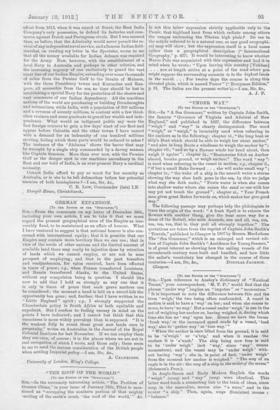"UNDER WAY."
[TO THE EDITOR OP TIIX " EPECTATOP....] Sin,—In "A Sea Grammar," written by Captain John Smith, the famous "Governor of Virginia and Admiral of New England," and published in 1627, the difference between "weigh" and " way " is clearly distinguished. The word " weigh," or " waigh," is invariably used when referring to the anchors as in the following : chapter vi., " the long boat or ship's Boat which should be able to weigh her sheet anchor," "and also in long Boats a windlesse to weigh the anchor by"; chapter vii., "and so by a Hawser winde her head about, then waigh it again° "; chapter ix., "Boatswaine fetch an Anchor aboord, breaks ground, or weigh anchor." The word " way "- is used when referring to the vessel in motion, e.g., chapter ii., "if but a small Rake forward . . . she will make small way "; chapter ix., " the wake of a ship is the smooth water a stern° chewing the way shee bath gone in the sea, by this we judge what way she doth make," "Fowle water is when she comes into shallow water where she raises the sand or ose with her way yet not touch the ground "; chapter xi., " Your French man gives great Rakes forwards on, which makes her give good way."
The following passage may perhaps help the philologists to trace the origin of the word: "A fresh Spell is to releeve the Rowers with another Gang, give the boat more way for a dram of the Bottell, who sails Amends, one and all, yea, yea, yea, yea, yea, that is, they pull all strongly together." The quotations are taken from the reprint of Captain John Smith's "Travels," published in Glasgow in 1907 by Messrs. MacLehose The "Sea Grammar," which is an enlarged and revised edi- tion of Captain John Smith's " Accidence for Young Seamen," is of great interest as showing how the sailing vessels of the seventeenth century were built and handled, and how little the sailor's vocabulary has changed in the course of three










































 Previous page
Previous page